Top News
Is Daniel Noboa the Answer to Ecuador’s Need for Change?

For generations, the Noboa family has helped shape Ecuador, overseeing a vast economic empire, including fertilizers, plastics, cardboard, the country’s largest container storage facility and, most famously, a gargantuan banana business featuring one of the world’s most recognizable fruit brands, Bonita.
One notable position has escaped them, however: the presidency. On five occasions, the head of the family conglomerate, Álvaro Noboa, has run for president and lost — in one case by two percentage points.
On Sunday, the Noboas may finally get their presidency. Mr. Noboa’s son, Daniel Noboa, a 35-year-old Harvard Kennedy School graduate who has used the same campaign jingle as his father, is the leading candidate in a runoff election. His opponent is Luisa González, the handpicked candidate of former President Rafael Correa, who beat the elder Noboa in 2006.
The legacy of the banana company — and Daniel Noboa’s association with it — is just one aspect of an election that centers on issues of employment and security in this country of 17 million on South America’s western coast that has been jolted by the extraordinary power gained by the drug trafficking industry in the last five years.
International criminal groups working with local gangs have unleashed an unprecedented surge of violence that has sent tens of thousands of Ecuadoreans fleeing to the U.S.-Mexico border, part of a migration wave that has overwhelmed the Biden administration.
Mr. Noboa rose unexpectedly from the bottom of the polls to a second-place finish in the first round of presidential elections in August, helped, experts said, by a widely lauded debate performance and the upending of the race by the shocking assassination of another candidate, Fernando Villavicencio, days before the vote.
Mr. Noboa has galvanized a base of frustrated voters on the back of a campaign promising change.
“He has been able to say that ‘I represent renewal in Ecuador,’” said Caroline Ávila, an Ecuadorean political analyst. “And that is why people are buying his message.”
Sunday’s election pits Mr. Noboa, a center-right businessman, against Ms. González, 45, a leftist establishment candidate, at a moment of deep anxiety in a country once a relatively peaceful island in a violent region.
Mr. Noboa, who declined several requests for an interview, has had a consistent lead in multiple polls since August, though it has narrowed slightly in recent days.
He has positioned himself as “the employment president,” even including a work application form on his website, and has promised to attract international investment and trade and cut taxes.
His opponent, Ms. González, has pledged to tap central bank reserves to stimulate the economy and increase financing for the public health care system and public universities.
On security, both candidates have talked about providing more money for the police and deploying the military to secure ports used to smuggle drugs out of the country and prisons, which are controlled by violent gangs.
Ms. González’s close association with Mr. Correa has helped elevate her political profile, but also hurt her among some voters.
Her first place finish in the first round was propelled by a strong base of voters nostalgic for the low homicide rates and commodities boom that lifted millions out of poverty during Mr. Correa’s administration. Ms. González’s campaign slogan in the first round was “we already did it and we will do it again.”
But building on that support is a challenge. Mr. Correa’s authoritarian style and accusations of corruption deeply divided the country. He is living in exile in Belgium, fleeing a prison sentence for campaign finance violations, and many Ecuadoreans fear that a González presidency would pave the way for him to return and run for office again.
Daniel Noboa is part of the third generation of his family that today operates a sprawling venture, but whose roots were in agriculture.
The Noboa family’s rise to prominence and wealth began with Luis Noboa, Daniel’s grandfather, who was born into poverty in 1916, but started building his business empire in the second half of the 20th century by exporting bananas and other crops.
His death in 1994 set off a bitter court battle on three continents among his wife and children for control of the business that finally ended in 2002, when a judge in London awarded Álvaro Noboa a 50 percent stake in the family’s holding company.
Álvaro expanded the company internationally, while also fighting multiple legal battles over back taxes and disputed payments to shipping companies.
As a politician, he described himself as a “messiah of the poor,” handing out free computers and fistfuls of dollars at his rallies, while also fending off accusations of child labor, worker mistreatment and union busting at his banana business. (He has claimed that the accusations were politically motivated.)
His son, Daniel, was raised in the port city of Guayaquil, where he founded an event promotion company when he was 18, before moving to the United States to study at New York University. Afterward he became commercial director for the Noboa Corporation and earned three more degrees, including a master’s in public administration from the Harvard Kennedy School.
He ran successfully for Ecuador’s Congress in 2021, positioning himself as a pro-business lawmaker, until President Guillermo Lasso disbanded the legislature in May and called for early elections.
Mr. Noboa has promoted a more left-leaning platform, railing against the banking industry and calling for more social spending.
A Harvard classmate and close friend of Mr. Noboa, Mauricio Lizcano, a senior official in Colombia, described the candidate as someone “who respects diversity and respects women, who believes in social issues” but is also “orthodox in economics and business.’’
Still, Mr. Noboa has not raised social issues on the campaign trail, and his running mate, Verónica Abad, is a right-wing business coach who has spoken out against abortion, feminism and L.G.B.T.Q. rights and expressed support for Donald J. Trump and Jair Bolsonaro, Brazil’s former far-right president.
Ms. Abad is “a really odd choice for someone like Noboa who’s trying to transcend this kind of left-right divide,” said Guillaume Long, a senior policy analyst at the Center for Economic and Policy Research and Ecuador’s former foreign minister under Mr. Correa.
Despite his family pedigree, Mr. Noboa has tried to set himself apart, pointing out that he has his own business and that his personal wealth is valued at less than $1 million.
While Álvaro frequently referred to Mr. Correa as a “communist devil,” his son has avoided directly attacking “correísmo.’’
“I never voted for his father, but this guy has a different aura, new blood, a new way of thinking,’’ said Enrique Insua, a 63-year-old retiree in Guayaquil. “He is charismatic.”
But like his father, Daniel has also drawn criticism from analysts who fear he could use the presidency to advance the family’s many businesses.
“Whether in the manufacturing sector, in services or agriculture, everything is under their control in some way or another,” said Grace Jaramillo, a political science professor and expert on Ecuador at the University of British Columbia in Canada.
“There’s no issue in economic policy that will not affect for the good or bad, any of their enterprises,” she added. “It’s a permanent conflict of interest.”
Ecuador’s economy was ravaged by the coronavirus pandemic, and just 34 percent of Ecuadoreans have adequate employment, according to government data.
Beyond the economy, the country heads to the polls during what has perhaps been the most violent electoral season in its history.
Beside Mr. Villavicencio — who was outspoken about what he claimed were links between organized crime and the government — five other politicians have been killed this year. Last week, seven men accused of killing Mr. Villavicencio were found dead in prison.
Mr. Lasso, the departing president, called for early elections to avoid an impeachment trial over accusations of embezzlement and widespread voter anger with the government’s inability to stem the bloodshed.
With news reports regularly featuring beheadings, car bombs and police assassinations, Mr. Noboa and Ms. González have vowed to rein in the violence, though neither has made security a central part of their campaigns.
Ms. González, during a presidential debate, pointed to the arrests of several leaders of criminal gangs when she served in the Correa administration.
“We will have the same iron fist with those who have declared war on the Ecuadorean state,” she said.
Mr. Noboa has proposed the use of technology, like drones and satellite tracking systems, to stem drug trafficking and has suggested building prison boats to isolate the most violent inmates.
But analysts say the two candidates have not done enough to prioritize combating the crime that has destabilized Ecuador and turned it into one of Latin America’s most violent countries.
“Neither Luisa González, nor especially Noboa seem to have much of a plan on security or to emphasize it,” said Will Freeman, a fellow in Latin America studies at the Council on Foreign Relations, a U.S. research institute. “It’s like politics is frozen in an era before all this happened.”
Thalíe Ponce contributed reporting from Guayaquil, Ecuador, and José María León Cabrera from Quito, Ecuador.
Top News
Putin in China: Xi Jinping welcomes Russian President

BEIJING (AP) — China’s leader Xi Jinping welcomed Russia’s President Vladimir Putin on Thursday as he began a two-day state visit while Moscow presses forward with a new offensive in Ukraine.
Putin arrived in Beijing by plane at dawn before his motorcade pulled in front of the Great Hall of the People in Tiananmen Square. Members of the People’s Liberation Army stood at attention while artillery fired a multi-gun salute.
Xi warmly greeted Putin as the shook hands at the bottom of the entrance to the classically designed building before they entered to hold talks.
Their meetings were expected to emphasize their commitment to the “no limits” relationship they signed in 2022, just before Russia launched its full-scale invasion of Ukraine. Since then, Russia has become increasingly economically dependent on China as Western sanctions cut its access to much of the international trading system.
On the eve of the visit, Putin said in an interview with Chinese media that the Kremlin is prepared to negotiate over the conflict in Ukraine. “We are open to a dialogue on Ukraine, but such negotiations must take into account the interests of all countries involved in the conflict, including ours,” Putin was quoted as saying by the official Xinhua News Agency.
The Russian leader’s two-day trip comes as his country’s forces have pressed an offensive in northeastern Ukraine’s Kharkiv region that began last week in the most significant border incursion since the full-scale invasion began, forcing almost 8,000 people to flee their homes.
Along with Moscow’s efforts to build on its gains in the nearby Donetsk region, the 2-year-old war has entered a critical stage for Ukraine’s depleted military that is awaiting new supplies of anti-aircraft missiles and artillery shells from the United States.
“We have never refused to negotiate,” Putin was quoted as saying by Xinhua. “We are seeking a comprehensive, sustainable and just settlement of this conflict through peaceful means. We are open to a dialogue on Ukraine, but such negotiations must take into account the interests of all countries involved in the conflict, including ours.”
Ukrainian President Volodymyr Zelenskyy has said any negotiations must include a restoration of Ukraine’s territorial integrity, the withdrawal of Russian troops, the release of all prisoners, a tribunal for those responsible for the aggression, and security guarantees for Ukraine.
China claims to take a neutral position in the conflict, but has backed Moscow’s contentions that Russia was provoked into attacking Ukraine by the West, despite Putin’s public avowals of his desire to restore Russia’s century-old borders as the reason for his assault.
Putin has blamed the West for the failure of negotiations in the opening weeks of the war and praised China’s peace plan for Ukraine that would allow Moscow to cement its territorial gains.
“Beijing proposes practicable and constructive steps to achieve peace by refraining from pursuing vested interests and constant escalation of tensions, minimizing the negative impact of the conflict on the global economy,” he had said.
Putin said a Chinese proposal in 2023, which Ukraine and the West rejected, could “lay the groundwork for a political and diplomatic process that would take into account Russia’s security concerns and contribute to achieving a long-term and sustainable peace.”
The Kremlin said in a statement that during their talks this week, Putin and Chinese leader Xi Jinping will “have a detailed discussion on the entire range of issues related to the comprehensive partnership and strategic cooperation and determine the new directions for further development of cooperation between Russia and China and also have a detailed exchange of opinions on the most acute international and regional issues.”
Putin began a fifth term in office this month.
Speaking Tuesday in the upper house of Russian parliament, Foreign Minister Sergey Lavrov said Moscow and Beijing are “objectively interested in maintaining our lead in efforts to establish a more fair and democratic world order.”
“Russia and China aren’t alone in their efforts to reform an international system and help establish a multipolar global order,” he said.
Lavrov noted that the “duet of Moscow and Beijing plays a major balancing role in global affairs,” adding that “the Russian president’s forthcoming visit to (China) will strengthen our joint work.”
Moscow has forged increasingly close ties with Beijing as the war has dragged into a third year, diverting the bulk of its energy exports to China and relying on Chinese companies for importing high-tech components for Russian military industries to circumvent Western sanctions.
The Russia-China military ties have also strengthened. They have held a series of joint war games in recent years, including naval drills and patrols by long-range bombers over the Sea of Japan and the East China Sea. Russian and Chinese ground forces also have deployed to the other country’s territory for joint drills.
China remains a major market for Russian military, while also massively expanding its domestic defensive industries, including building aircraft carriers and nuclear submarines.
Putin has previously said that Russia has been sharing highly sensitive military technologies with China that helped significantly bolster its defense capability. In October 2019, he mentioned that Russia was helping China to develop an early warning system to spot ballistic missile launches — a system involving ground-based radar and satellites that only Russia and the U.S. possessed.
___
Bodeen reported from Taipei.
Top News
Blinken’s Kyiv song choice raises eyebrows as Ukraine fights fierce Russian attacks

KYIV, Ukraine (AP) — Fresh from a day of delivering optimistic prognoses about how Ukraine would fare in the war with Russia despite gloomy news from the front lines, U.S. Secretary of State and amateur musician Antony Blinken may have thought he had the perfect upbeat song to perform with a Kyiv bar band on his fourth visit to the capital since the conflict began in 2022.
“I know this is a really, really difficult time,” Blinken told a packed crowd in the subterranean club Barman Dictat on Tuesday night.
“Your soldiers, your citizens, particularly in the northeast in Kharkiv, are suffering tremendously,” he said. “But they need to know, you need to know, the United States is with you, so much of the world is with you. And they’re fighting not just for a free Ukraine but for the free world, and the free world is with you, too.”
With those words and strumming a red guitar, Blinken and the local group 19.99 launched into Neil Young’s hit “Rockin’ in the Free World,” ostensibly to encourage Ukrainians to keep up the fight against Russia and hold to their Western aspirations, despite numerous battlefield setbacks that led President Volodymyr Zelenskyy a day later to cancel all his upcoming foreign trips.
With its refrain “Keep on rockin’ in the free world,” Young’s 1989 song sounds like it should be an homage to the glory of living in the West, uncompromised by communism or authoritarianism. In fact, as numerous social media critics noted, the tune is a lament about despair and misery caused by homelessness, drug addiction and poverty in the celebrated free world.
A charitable interpretation might be that Blinken chose to perform the song to underscore the importance of overcoming adversity by sticking to ones’ dreams of peace and freedom. After all, that had been the general theme of his remarks at events in Kyiv since his nearly pre-dawn arrival after an overnight train trip from Poland and it would continue to be on Wednesday.
“I’ve come to Ukraine with a message: You are not alone,” Blinken had told an audience of students and educators at the Kyiv Polytechnic Institute shortly before taking to Barman Dictat’s basement stage.
“Never bet against Ukraine,” he said at a Wednesday news conference with Ukrainian Foreign Minister Dmytro Kuleba.
But as Blinken sang the “keep on rockin’ in the free world” chorus, which is repeated 12 times in the 4-minute 40-second song, Russian troops were advancing near and around Kharkiv, Ukraine’s second-largest city, and Zelenskyy was in the process of deciding to put off a planned trip to Spain and Portugal later this week to deal with the crisis.
Thus, any intended musical encouragement — in both content and venue — left at least some observers scratching their heads.
Kyiv-based analyst Oleksandr Kraiev, director of the North America program at the Ukrainian Prism think tank, said Blinken’s visit was welcome but pointed out that he and many Ukrainians were puzzled by his two-day stay, including his stop at Barman Dictat, which was seen as inappropriate by some, given the current fraught wartime climate.
“From my point of view, and generally speaking from the point of view of common Ukrainians, it was not a very appropriate sign to go to the bar to have a small song with our band,” he said, noting that Ukrainian military recruitment officers are known to go to bars and nightclubs to check documents and catch draft dodgers.
“So (for the) secretary of state of the United States also to go to a bar, to have a small concert for people who are blamed for not enlisting in the Ukrainian army,” Kraiev said, “it’s not, let’s say, a catastrophe, it’s not a faux pas, but it’s something that is not very desirable from the point of view of common Ukrainians.”
U.S. officials with Blinken shrugged at the online criticism the secretary was receiving about his song choice and decision to sing at a bar. They also said he wouldn’t have done the event if he had thought it was inappropriate.
More broadly, the possible disconnect between the week’s battlefield developments and Blinken’s optimism was reflected in his activities and the size of his delegation.
Unlike on all of his three previous wartime trips to Kyiv, Blinken brought a full complement of staff and press with him. And while security was tight, he spent a good deal of time away from meetings with government officials, engaging with university students, civic leaders, local businesspeople and, of course, bar-goers. And, unlike on all of his previous visits except his last visit in September, he chose to spend the night in the city.
Yet, it may be “Rockin’ in the Free World,” its chorus and opening stanza — “There’s colors on the street; Red, white and blue; People shufflin’ their feet; People sleepin’ in their shoes; But there’s a warnin’ sign; on the road ahead; There’s a lot of people sayin’; we’d be better off dead.” — that the visit is remembered for.
As the band hit the opening notes, Blinken commented wryly: “I don’t know if we can pull this off.” And, then, according to the official State Department transcript: “(Music was played.)”
___
Samya Kullab contributed.
Top News
A timeline of territorial shifts in Ukraine war

Russian troops have launched a ground offensive along the northeastern border with Ukraine, opening a new front in the two-year war while pushing deeper in the country’s east.
Source link
-
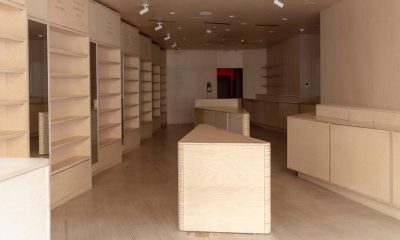
 Tech7 months ago
Tech7 months agoBehind the Closing of Shen Beauty, a Brooklyn Boutique
-
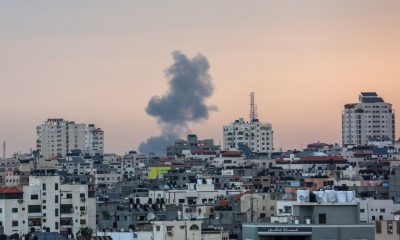
 Tech7 months ago
Tech7 months agoHamas Seeds Violent Videos of Israel Attack on X and Telegram
-
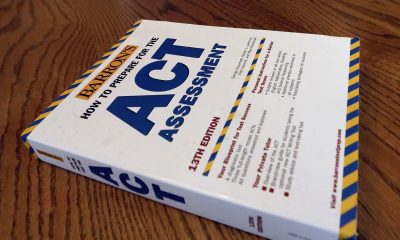
 Top News7 months ago
Top News7 months agoACT test scores for US students drop to new 30-year low
-
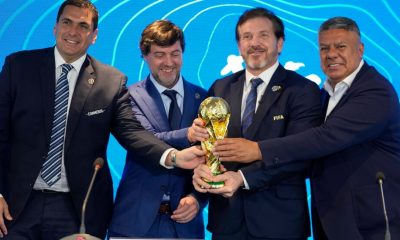
 Top News7 months ago
Top News7 months agoFIFA Will Host 2030 World Cup on Three Continents
-
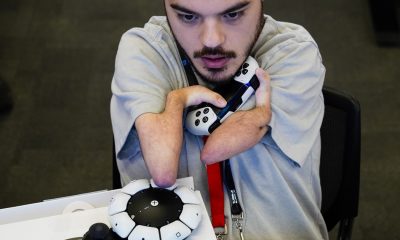
 Top News7 months ago
Top News7 months agoSony’s Access controller for the PlayStation aims to make gaming easier for people with disabilities
-

 Business7 months ago
Business7 months agoExxon Acquires Pioneer Natural Resources for $60 Billion
-
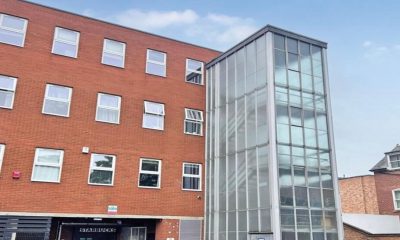
 Tech7 months ago
Tech7 months agoA Stairway to Nowhere Sells for $32,000 in London
-

 Sports7 months ago
Sports7 months agoNew doc is ’emotional rollercoaster’ for Beckham



